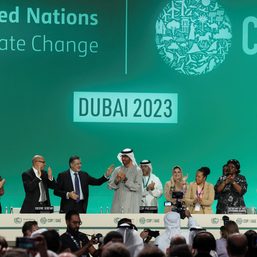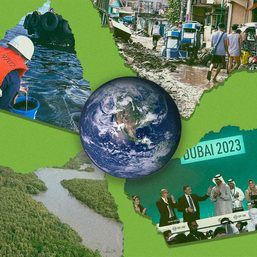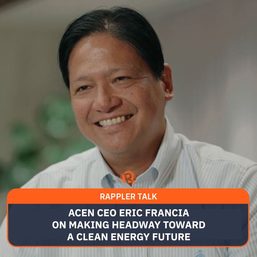SUMMARY
This is AI generated summarization, which may have errors. For context, always refer to the full article.

DOHA, Qatar – The Organization of the Petroleum Exporting Countries’ (OPEC) top Arab energy ministers arrived in Doha on Monday, December 11, for the 12th Arab Energy Conference as countries clash at the United Nations’ COP28 climate summit over a possible agreement to phase out fossil fuels.
OPEC Secretary General Haitham Al Ghais in a letter dated Wednesday, December 6, and seen by Reuters urged OPEC members to reject any COP28 deal which targets fossil fuels rather than emissions.
Countries in OPEC hold about 80% of the world’s proven oil reserves, most of which is concentrated among Middle Eastern members.
For the majority of those countries, oil revenue is the main source of income, so any message from COP28 aimed at slashing oil and gas demand becomes a question of survival.
Ministers from Iraq, Kuwait, Algeria, Libya, and non-OPEC member Oman arrived for the energy meeting, as well as Saudi Energy Minister Prince Abdulaziz bin Salman who had been in Dubai for the UN climate summit.
United Arab Emirates Energy Minister Suhail Mohamed Al Mazrouei was absent.
The UAE, the second Arab country to host the climate summit after Egypt in 2022 and an OPEC member, has alongside other Gulf energy producers called for what they consider a more realistic energy transition in which fossil fuels retain a role in securing energy supply while industries decarbonize.
Sultan al-Jaber, who is chief of UAE state oil giant Abu Dhabi National Oil Company and president of COP28, has maintained that a phasedown of fossil fuels is inevitable and essential, but is part of a transition that takes into account the circumstances of each country and region.
Saudi Arabia, the de-facto leader of OPEC, and top ally Russia are among several countries insisting that the COP28 conference in Dubai targets emissions, rather than the fossil fuels causing them, according to observers in the negotiations.
Qatar, which left OPEC in 2018, but whose position is largely aligned with other oil- and gas-producing nations, said that it had invested tens of billions of dollars in its liquefied natural gas industry, even when many doubted the feasibility of such investments.
“Our decision at the time was based on a realistic understanding of market fundamentals and efforts to reduce global carbon emissions,” Saad al-Kaabi, the head of Qatar’s state-run energy company, told the conference.
Phaseout
At least 80 countries including the US, the European Union, and many poor, climate-vulnerable nations are demanding that a COP28 deal call clearly for an eventual end to fossil fuel use.
“Kuwait works according to a policy based on preserving the sources of petroleum wealth and their optimal exploitation and development,” Oil Minister Saad Al Barrak said, adding that oil was a primary energy source for Kuwait and the rest of the world.
Kuwait reaffirmed its rejection for the inclusion of any call for phasing out fossil fuels consumption and production in the COP28 draft final climate deal, he later said in remarks to Kuwait’s state news agency. However, the minister said his country deeply believes in the need to cut greenhouse gas emissions to protect the environment.
Like Kaabi, Barrak also spoke of the importance of investing in order to increase production capacity for fossil fuel-based energy resources.
Deals at UN climate summits must be passed by consensus among the nearly 200 countries present. The summits aim to establish a consensus on the world’s next steps to address climate change – though it is up to individual countries to ensure it happens through their national policies and investments.
COP28 is scheduled to end on Tuesday, December 12, as is the two-day 12th Arab Energy Conference. – Rappler.com
Add a comment
How does this make you feel?






![[OPINION] Hoping amidst ‘this thing’: COP28 reflections from a 24-year-old first-timer](https://www.rappler.com/tachyon/2024/01/imho-c0-28-reflection.jpg?resize=257%2C257&crop=297px%2C0px%2C720px%2C720px)

![[OPINION] Is limiting warming to 1.5°C still alive after COP28?](https://www.rappler.com/tachyon/2023/12/imho-cop28.png?resize=257%2C257&crop=285px%2C0px%2C720px%2C720px)

There are no comments yet. Add your comment to start the conversation.